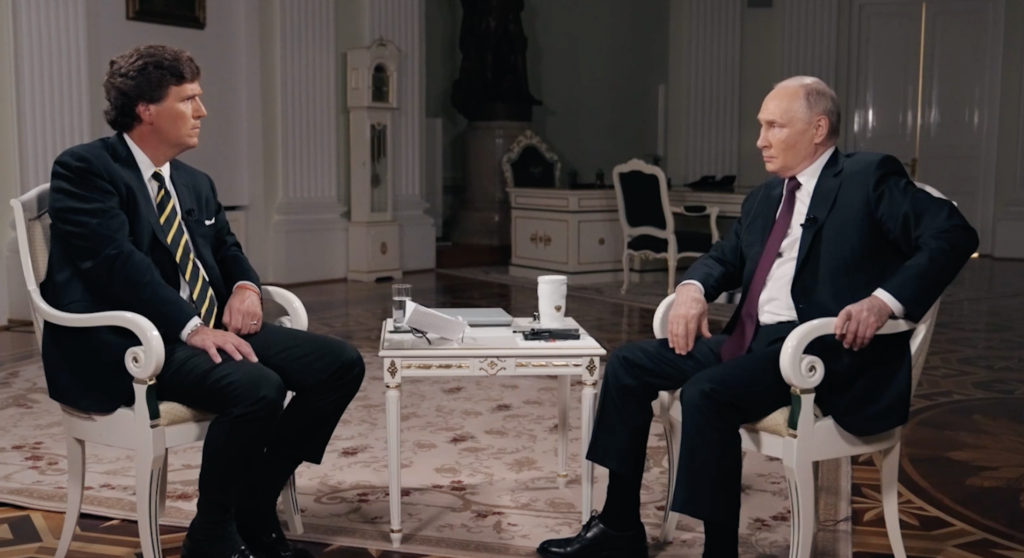Russian President Vladimir Putin described the war in Ukraine as having “an element of a civil war” amid an unusual acknowledgment that Russian-speaking Ukrainians are fighting to repel his invading forces.
“What is happening is, to a certain extent, an element of a civil war,” Putin told Tucker Carlson, the ousted Fox News host who was granted an interview in the Kremlin. “Everyone in the West thinks that the Russian people have been split by hostilities forever. … The unity is still there.”
That claim extends Putin’s long-standing habit of claiming that the people of Russia and Ukraine are “one people.” He has justified the invasion of Ukraine by alleging that the Ukrainian government intended to perpetrate a “genocide” against Russian-speaking Ukrainians in the eastern part of the country. And yet his latest attempt to assert the unity of the two countries turned on an anecdote that portrayed a unit of Russian-speaking Ukrainian troops, surrounded by Russian forces, as relentless defenders of their country.

“Our soldiers were shouting to them, ‘There is no chance. Surrender yourselves. Come out and you will be alive,’” Putin told Carlson through an interpreter. “Suddenly, the Ukrainian soldiers were screaming from there in Russian, perfect Russian, saying, ‘Russians do not surrender.’ And all of them perished. They still identify themselves as Russian.”
Putin offered that anecdote at the conclusion of a two-hour conversation with Carlson, who said afterward that the Kremlin strongman is “not good at explaining himself” despite his intelligence because he is “clearly spending a lot of time in a world where he doesn’t have to” do so. “He didn’t, sort of, lay out his case very coherently,” Carlson said.
Their conversation began with a roughy 25-minute account of Russian history from Putin’s perspective. He drew a historiographical line from the baptism of a certain Prince Vladimir, who ruled Kyiv in 988, to World War I, through the period in which the territory now called Ukraine was part of the Polish-Lithuanian Commonwealth, a vast European state destroyed by the Russian empire and other neighbors in the 18th century, down to the First World War. Throughout this account, Putin insisted that the notion of a distinct Ukrainian identity was fomented by central and Western Europeans.
And he cast the infamous Molotov-Ribbentrop Pact, the agreement in which Nazi Germany and the Soviet Union agreed to divide central and Eastern Europe between themselves before they launched their joint invasion of Poland at the beginning of the Second World War, as a mechanism for restoring Russia’s patrimony.
“Under the well-known Molotov-Ribbentrop Pact, a part of the territory including western Ukraine was to be given to Russia, thus Russia, which was then named the USSR, regained its historical lands,” he said, according to Carlson’s transcription.
Putin continued his account by protesting NATO’s expansion in the decades after the Cold War. He offered no explanation for why so many states in the former Soviet Union wanted to join NATO — they saw evidence of Russia’s ongoing imperialist ambitions even in the first few years after the dissolution of the Soviet Union, as the first Estonian president warned at a conference in Germany in 1994. Carlson concluded that Putin is “wounded by the rejection of the West” but acknowledged implicitly that he is unfamiliar with the history of those years.
“The West rejected Russia, and maybe — I’m not even taking sides in this — maybe there were good reasons,” he said. “I don’t know what they would be. But, the West was determined not to be allied with Russia.”
That account of Russian relations with Western powers in recent decades conflicts with the perspective of high-profile Russian dissidents and landmark U.S. policy statements. President George H.W. Bush urged Ukraine to remain a member of (a presumably evolving) Soviet Union during a visit to Kyiv in 1991. And the late Anna Politkovskaya, an arch-Putin critic and journalist who was murdered in 2006, rebuked Western governments for viewing Putin through “rose-colored glasses” two years before her death.
CLICK HERE TO READ MORE FROM THE WASHINGTON EXAMINER
“Putin, a product of the country’s murkiest intelligence service, has failed to transcend his origins and stop acting like a KGB officer,” she wrote in Putin’s Russia: Life in a Failing Democracy. “This book is also about the fact that not everyone in Russia is prepared to put up with Putin’s kind of government. We no longer want to be under anyone’s thumb, even if that is what best suits the West.”
Putin claimed in 2002 that he would not object to Ukraine’s eventual entry into NATO. “At the end of the day, the decision is to be taken by NATO and Ukraine,” he said during a press conference.
You can watch the interview in full here:
